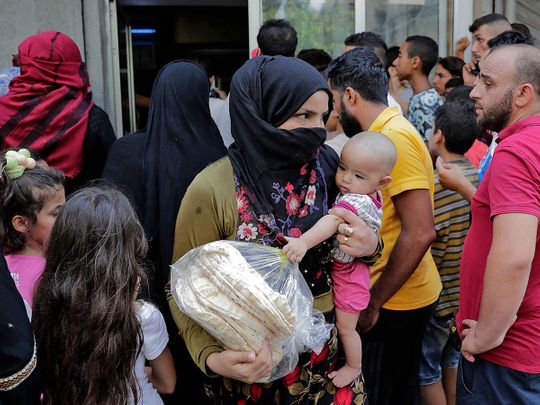Travelling ‘across’ and ‘down’
 ]
]
Image Credit: Stock photo/Pexels
As we grow older, we are told that the best way to keep our brain sharp is to solve crosswords or Sudoku. I am addicted to both but am not sure if this is helping to boost my brain power.
In my family, the fight for the newspaper was a struggle for power. This epic battle was always won by my father who got first dibs at it and the rest of us meekly surrendered this precious prize to him even if we laid our hands on it first. It was an unwritten rule. While we children waited for him to peruse the paper, the booking started. Cries of ‘I’m next’ rent the air amid arguments over who said it first. However, a stern glance from over the newspaper put an end to the dissent. Of course we were interested in the comics section and the word games but my father knew better than to hand out pages to us. In the scramble for possession, the pages would be returned to him bearing signs of a tug of war.
For the cruciverbalist or avid crossword puzzle solver, the puzzle is something to be savoured and time spent on it is well worth the effort. Making sense of the cryptic clues is a challenge and the sense of satisfaction in deciphering the convoluted mind of the setter is indescribable. The clue that refuses to yield an answer despite hours of thought is the one that haunts you for the rest of the day. It’s like that tune you find yourself humming but are unable to place.
When I was living in Dubai and came home for a holiday, I lived with my sister who jealously guarded the newspapers every morning from my marauding hands. Her morning ritual was to lay out the newspapers on the dining table as I sat across her, eyeing those sheets of paper. As I waited patiently, she would deign to hand me the tabloid section of one newspaper with strict instructions on what I could do. The crossword puzzles were hers and I was allowed to do one Sudoku out of two. Although solving Sudoku wasn’t her forte, she insisted on trying to do one. After all it was her newspaper! After a while, when she had made a mess of her Sudoku, she would generously tell me I could finish it. Now if there’s one thing I hate it is finishing someone else’s botched effort. The offer would be haughtily declined.
I continued to sit there as she tackled the crosswords. Every now and then she would read out a clue, asking for help. She would be met with an ominous silence. That was like rubbing salt in my wounds. After what seemed ages, the paper would be tossed at me to peruse. I was tempted to ignore that peace offering but beggars can’t be choosers, right?
Now I sit with my newspapers in my own home with no one to fight over the crosswords or Sudokus and I am in seventh heaven. I read somewhere that the height of egotism is doing The New York Times crossword puzzle with a pen. I do use a pen but what I tackle are crosswords that aren’t as complicated as those in the paper mentioned above.
With the pandemic ensuring we have time on our hands, crossword puzzles have seen a surge of popularity. Although there are many Indians who take part in international clue setting competitions, most publications in India carry syndicated crosswords from UK newspapers which have regional references rather than using Indian solvers who would appeal to an Indian audience.
I remember how impressed I was when I heard that a retired army officer living near us set cryptic crosswords for a reputed Indian newspaper. Now that is a skill indeed.
Sharjah book authority: More diversity, more books, more readers in the UAE
 ]
]
Image Credit: Stock photo/Pexels
There is a joy in the written word and often books that get overlooked in our digital world, a place where we seem obsessed with the instant, the image and video clips. But those who value books know that there is nothing quite like sitting in a quiet corner, leafing through pages, sharing the dreams and experiences of the writer, and slipping into an imaginary world shaped just by the words and phrases falling from sentences.
The reality is that the joy of reading can be experienced by anyone. And that’s a reality Sharjah Book Authority (SBA) has recognised by its launch of a new global cultural campaign.
‘If you’re into something, you’re into books’ is the slogan being used by the SBA and it does manage to underscore the full reach of the written word for all. As the SBA notes, whether you are a gamer, musician, athlete, biker, or fashion enthusiast, … there is a book for that. It highlights that apart from popular genres including books on research and academics, people can find books catering to all interests. No matter how simple, strange, or rare the topic, books are available on them and are waiting to be discovered. And that’s the joy of the world of publishing.
This is a unique campaign, one that is truly international in scale and one that emphasises the global reach of publishing and its importance in our daily lives regardless of where we call home. The SBA campaign has been launched globally, and it is the largest of its kind. The authority has also launched the campaign simultaneously in both Arab and wider international cities, adding significance to the global reach of this campaign.
This innovative and imaginative initiative by SBA has been launched in written, audio and visual formats and is also being presented in the native languages of many countries — again positive reinforcement of the way books touch each and every one of us regardless of where we live.
The SBA campaign is confirmation that books and words tie us all together, allowing us to share stories, cultures, heritage and the manner in which the written word can alter our relationship with each other and the word.
Regardless of our creed, colour, age, cultural or socioeconomic background, there is a commonality that unites us. Our imagination and knowledge are expanded through every sentence or image that jumps from a page.
Corruption, sectarianism mars Lebanon
 ]
]
A woman carrying a toddler leaves a bakery with a bag of bread as people wait for their turn, in the neighbourhood of Nabaa in the Lebanese capital Beirut’s southern suburbs amidst a wave of shortages of basic items due to a severe economic crisis. Image Credit: AFP
Lebanon’s troubles are expected to get much worse as the country’s Central Bank decided unilaterally to end fuel subsidies in an attempt to protect the country’s foreign currency reserves, but the move will certainly add additional financial burden on the Lebanese people, with half of them already living under the poverty line.
The Lebanese government on Thursday rejected the Central Bank’s decision, insisting that the current subsidised prices “must not change and subsidies must continue until measures are in place to help the poor.”
Fuel subsidies cost the country at least $3 billion last year, according to the Central Bank’s powerful governor Riad Salameh. However, the loss of fuel subsidies would open a new phase in Lebanon’s financial crisis in which the national currency, the Lira, has already lost 90 per cent of its value.
Inflation and unemployment rates have skyrocketed, essential food items and medicine has virtually disappeared while severe shortage of fuel and electricity has led to sporadic protests.
The latest crisis comes as Lebanon continues to be without a functioning government as the Prime Minster designate Najib Mikati is yet to form a government. He was picked to lead a new cabinet following the withdrawal of former Prime Minster Saad Al Hariri to form a government after a year of deliberation and futile negotiations with President Michel Aoun and the main political parties over their shares of ministerial portfolios.
A caretake government led by Hassan Diab, which had resigned in August 2020, days after the catastrophic explosion in Beirut port, has shown no interest in taking any serious initiative to ease the economic crisis, described recently by the World Bank as one of the world’s worse three economic crisis in the last 150 years!
Diab called Salameh’s move to end the fuel subsidies as “unacceptable” but offered no alternative solution, while the Central Bank’s chief says his decision was the final resort to protect Lebanon’s foreign currency reserves which have been increasingly diminishing in the last two years due to subsidy policy and the continuing economic crisis because of political deadlock and coronavirus impact, which affected Lebanon’s main revenue source, travel and tourism.
In reality, the subsidies crisis reflects the deeper economic, political and social predicament in the country that was once described as the Switzerland of the Middle East.
Lebanon’s root problem is the failure of its political class to rise above their selfish political and financial interests (coupled of course by rife corruption and tribal and sectarian loyalties) to offer a viable remedy to a misfunctioning system.